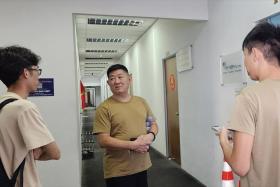Heartland anger, election heartbreak?
Rural Malay settlers, a powerful voter base, are upset with national palm oil operator Felda for spending big bucks to take a stake in Indonesian firm
The Malaysian plantation district of Sungkai has become an initial - and unlikely - battleground for an election that Prime Minister Najib Razak (right) is expected to call this year.
The former mining town in Perak is home to ethnic Malays who work for the national palm plantation operator, Federal Land Development Authority (Felda).
Mainly rural poor, they were resettled and employed in the palm industry and have long been among the beneficiaries of government affirmative action programmes for Malays.
The settlers have been a rock solid vote bank for Mr Najib's ruling coalition, even as many urban Malays have turned to the opposition.
The opposition is hoping the settlers would be the next to defect. That is why Parti Keadlian Rakyat's Rafizi Ramli was in Sungkai on Sunday night.
The settlers have been angered by Felda's decision to purchase a 37 per cent stake in Indonesian palm oil firm PT Eagle High Plantations for US$505 million (S$719 million), more than a 100 per cent premium based on its closing share price on Wednesday.
On Sunday, a cheering crowd of more than 300 gathered on the lawn of a Sungkai resident under a dank tropical night to hear opposition lawmaker Rafizi say: "We will change our prime minister and our government.
DEBTS
"Felda's debts are growing... and the government will use the settlers' money to pay it off," said Mr Rafizi, 39. "If we don't stop this, the debt will be shouldered by our future generations."
Felda settlers are the majority voters in at least 54 of the 222 seats in parliament, and have helped bring the Umno-led Barisan Nasional coalition to power.
Even the opposition's attempt to highlight a multi-billion dollar alleged money-laundering scandal at state investment fund 1Malaysia Development Berhad that erupted in 2015 did not resonate with rural voters.
The Felda issue, however, affects them directly.
Mr Mazlan Aliman, president of the National Felda Settlers' Children's Society, said: "All this while, Umno has won the elections because there are 54 parliamentary seats in the Felda (settlers) areas.
"Now, I am sure the sentiment has changed."
He estimates that over half of his association members and their families will vote for the opposition party if the Eagle High deal goes through.
"If this happens, (Barisan Nasional) will lose in the upcoming elections," he said.
Mr Najib has to call elections by next year, but a government source said he may do it earlier, possibly in the second half of this year.
But the prime minister is fighting economic headwinds.
The ringgit has fallen by more than a quarter over the past two years; prices have risen after state subsidies were slashed and a national goods and services (GST) tax launched; and economic growth is expected to slow this year.
Felda's fortunes have slumped in recent years - its shares fell by over 60 per cent since its IPO in 2012. The shares plunged another 5 per cent on Dec 23, when the Eagle High deal was announced.
"This is a waste of money," said Mr Khalili Kasim, 64, a settler. He added that Felda should be providing housing loans, or educational aid instead of giving money to Eagle High.
He asked: "Land owners should be rich, but why are some of us still struggling and living under the poverty line?"
Despite this, the opposition will be fighting an uphill battle to secure the votes of the settlers.
"In the lead-up to the elections, if they (Umno) can develop measures that can persuade the voters... then they can still mitigate the concerns arising from the purchase of Eagle High,"said Mr Ibrahim Suffian, director of independent opinion polling firm Merdeka Centre.
"But this is not a done deal; it is a developing story." - REUTERS
Get The New Paper on your phone with the free TNP app. Download from the Apple App Store or Google Play Store now


